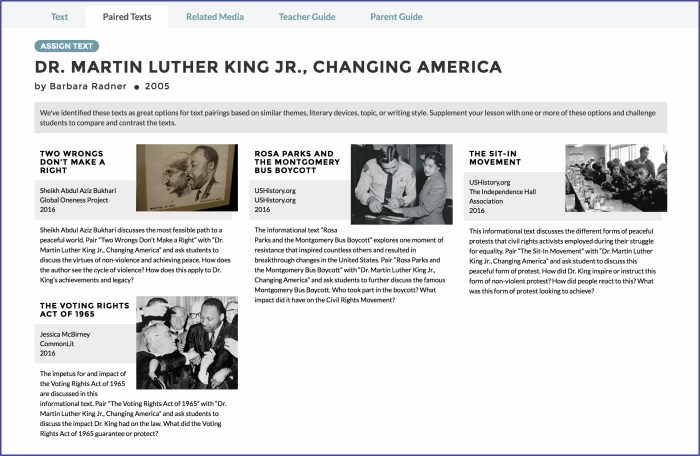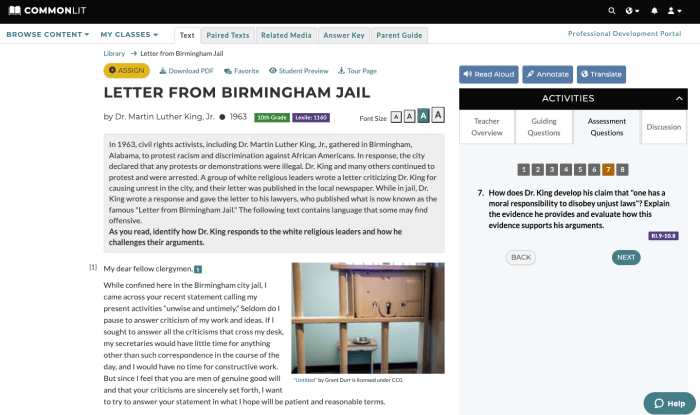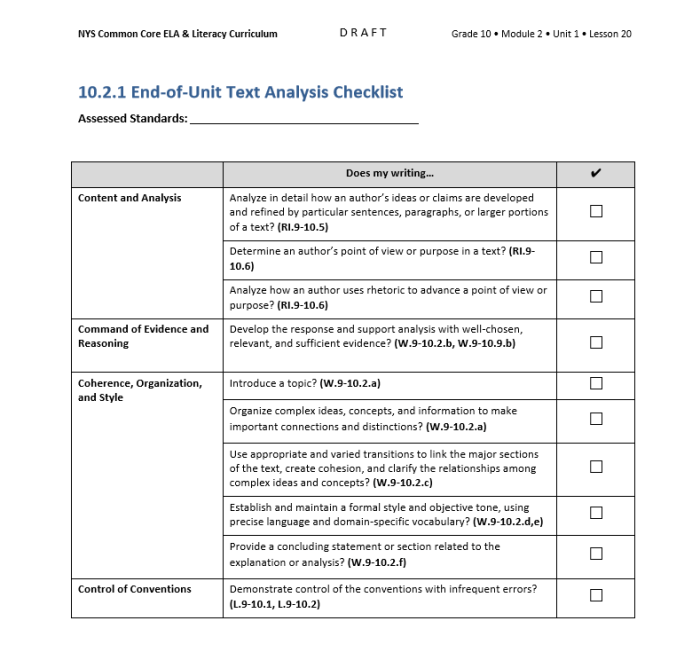Embark on a profound exploration of the CommonLit Letter from Birmingham Jail assessment answers, uncovering the depths of Dr. Martin Luther King Jr.’s powerful message. This comprehensive guide delves into the historical context, key arguments, rhetorical devices, and enduring impact of this seminal work.
Through meticulous analysis and engaging insights, we illuminate the letter’s critique of moderate white clergy, the imperative of nonviolent resistance, and King’s vision for a just and equitable society.
Introduction

The “Letter from Birmingham Jail” is a pivotal document in the history of the American Civil Rights Movement. Written by Dr. Martin Luther King Jr. in 1963 while imprisoned for his role in nonviolent protests, the letter eloquently articulates the moral and strategic rationale for the struggle for racial justice.
In this letter, King responds to a group of moderate white clergy who had criticized his methods of protest. He argues that the time for waiting and gradualism is over and that direct action and nonviolent resistance are necessary to achieve true equality for African Americans.
Analysis of Key Arguments

King’s Critique of the “Moderate” White Clergy
King accuses the moderate clergy of being more concerned with maintaining the status quo than with confronting the evils of racism. He argues that their “wait-and-see” approach has allowed injustice to fester for far too long.
King’s Argument for the Importance of Direct Action and Nonviolent Resistance, Commonlit letter from birmingham jail assessment answers
King believes that direct action is necessary to break down the barriers of segregation and discrimination. He argues that nonviolent resistance is the most effective way to achieve this goal because it appeals to the conscience of the oppressor and creates a moral force that cannot be ignored.
King’s Vision of a Just and Equitable Society
King envisions a society where all people are treated with dignity and respect, regardless of their race or background. He believes that this society can only be achieved through nonviolent resistance and the power of love.
Rhetorical Devices and Techniques

Use of Metaphors, Similes, and Allusions
King’s letter is filled with vivid metaphors, similes, and allusions. He compares the struggle for racial justice to a “mighty stream of justice” that will eventually sweep away the barriers of segregation. He also alludes to the Bible and the American Revolution to support his arguments.
Effectiveness of King’s Use of Personal Anecdotes and Historical Examples
King’s letter is also notable for its use of personal anecdotes and historical examples. He recounts his own experiences with racism and draws inspiration from the lives of other great leaders, such as Mahatma Gandhi and Abraham Lincoln.
King’s Language and Tone
King’s language and tone are both passionate and persuasive. He uses strong, emotional language to convey the urgency of the struggle for racial justice. However, he also maintains a respectful and dignified tone, even when addressing his critics.
Impact and Legacy

Historical Impact of the “Letter from Birmingham Jail”
The “Letter from Birmingham Jail” had a profound impact on the Civil Rights Movement. It helped to galvanize support for the movement and inspired activists to continue their struggle for racial justice.
Influence on the Civil Rights Movement and Beyond
The letter’s influence extended beyond the Civil Rights Movement. It has been cited as an inspiration by leaders of other social justice movements, such as the anti-apartheid movement in South Africa and the women’s rights movement.
Continued Relevance and Significance Today
The “Letter from Birmingham Jail” remains relevant today as a powerful reminder of the importance of nonviolent resistance and the struggle for racial justice. It is a document that continues to inspire and motivate activists around the world.
FAQs: Commonlit Letter From Birmingham Jail Assessment Answers
What is the main argument of King’s Letter from Birmingham Jail?
King argues that nonviolent direct action is necessary to challenge unjust laws and that moderate white clergy have failed to support the Civil Rights Movement.
How does King use rhetorical devices in the letter?
King employs metaphors, similes, allusions, and personal anecdotes to enhance the emotional impact and persuasiveness of his arguments.
What is the historical significance of the Letter from Birmingham Jail?
The letter became a pivotal document in the Civil Rights Movement, galvanizing support for nonviolent resistance and contributing to the passage of the Civil Rights Act of 1964.